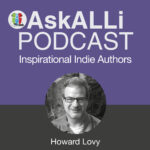 In my latest Inspirational Indie Author interview, I talked to Maggie Lynch about women in science fiction.
In my latest Inspirational Indie Author interview, I talked to Maggie Lynch about women in science fiction.
Maggie writes science fiction for and about women. And I, for one, welcome females of the human species to outer space as real characters.
Like many awkward, nerdy boys, I grew up reading a lot of science fiction. This was in the 1970s, so I read all the classic. And for the most part, they were very male-centric. Space, it seemed, was a very male-dominated place. That bleak future for women is changing now, although not without some backlash.
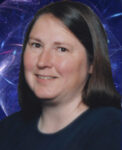
Maggie Lynch
So, to help us make sense of this brave new female sci-fi world, I spoke to Maggie, who writes a series of science fiction books she shares with other indie authors, called Obsidian Rim.
We live in a sharing economy these days, and that is kind of the idea behind the writing of the Obsidian World book series. She and eight other indie writers contribute to the series, resulting in a new story every two weeks.
In our interview, Maggie also describes her new book, Gravity, which has all the elements of space opera, but with “a romantic twist.” Maggie talks about what that means.
A few highlights ..
On Women in Science Fiction
Now that women are entering science fiction in larger numbers, there is a better representation of real women and their role in saving the world or the galaxy or maybe just their own little piece of Earth.
On the Fast-Release Model for the Obsidian Rim Series
We also learned that a fast release model is really important as genre fiction readers love series, but they want to read them one right after another really quickly. And so we couldn't work on the model of, you know, “Oh, we'll put out a book once every three to six months.” So we decided to do it once every two weeks.
Listen to the Interview with Maggie Lynch
Subscribe to our Ask ALLi podcast on iTunes, Stitcher, Player.FM, Overcast, Pocket Casts, or via our RSS feed:
If you haven’t already, we invite you to join our organization and become a self-publishing ally. You can do that at http://allianceindependentauthors.org.
About the Host
Howard Lovy has been a journalist for more than 30 years, and has spent the last five years amplifying the voices of independent publishers and authors. He works with authors as a book editor to prepare their work to be published. Howard is also a freelance writer specializing in Jewish issues whose work appears regularly in Publishers Weekly and Longreads. Find Howard at howardlovy.com, LinkedIn and Twitter.
Read the Transcript
Howard Lovy: I'm Howard Lovy and you're listening to Inspirational Indie Authors. Like many awkward and nerdy boys I grew up reading a lot of science fiction, and this was in the 1970s so I read all the classics. And, for the most part, they were very male-centric. Space, it seemed, was a very male-dominated place. That bleak future for women is changing now, although not without some backlash. So, today, to help us make sense of this brave new female sci-fi world is Maggie Lynch, who writes a series of science fiction books she shares with other indie authors called Obsidian Rim. Hello Maggie. And welcome to Inspirational Indie Authors.
Maggie Lynch: Thank you so much for including me today.
Howard Lovy: Oh sure, no problem. So, before we talk about your books, First, did I get that right? Women are reading more science fiction, so the depiction of women is improving.
Maggie Lynch: Well, actually women have been reading science fiction for a long time. And in fact some women wrote science fiction, against all odds, back in the ‘70s when you were reading. But they were often under male pen names for some of the backlash that you talked about. But now that women are entering science fiction in larger numbers, there is a better representation of real women and their role in saving the world or the galaxy or maybe just their own little piece of earth.
Howard Lovy: So tell me more about your other demographics. You studied this market a great deal.
Maggie Lynch: Yes. Well, my partner in this venture is Jessa Slade, who writes as Elsa Jade in this series and she's been involved in a lot of world projects in both fantasy and science fiction for about four years. And so together when we decided we wanted to coordinate something together, we looked at what has been the most successful shared worlds in terms of leadership and income. And we asked people who participated in that, you know, why they thought that was successful. And we also looked at those that had failures and asked what happened there. And one of the things that we learned is that the world needs to be really tightly connected between the stories in order to have readers want to connect from one book to the next, even though they may not know the next author. And we also learned that a fast release model is really important as genre fiction readers love series, but they want to read them one right after another really quickly. And so we couldn't work on the model of, you know, “Oh, we'll put out a book once every three to six months.” So we decided to do it once every two weeks.
Howard Lovy: Once every two weeks? That's quite a killer pace.
Maggie Lynch: Well, except with eight authors, it's not, so I'm not writing a book every two weeks, but we're releasing a book in a series every two weeks.
Howard Lovy: But, but still, you know, that's still quite a lot of writing. So how's that experiment going so far?
Maggie Lynch: Well, so far we've only released the first two books and so it's really too early to tell. My book released two weeks ago and I'm Elsa Jade's book released just Tuesday. So we're doing pretty well. We're not hitting any bestseller lists, but we're staying in a good range for both of us. And I think as it goes on that we'll really see, I hope, the fan base increasing. Because the other thing about a shared world is that you have eight authors not only writing in the world to help feed the fans, but also marketing for each other and pushing out to their fan base. And so that should multiply and help us with just bringing in new people all around.
Howard Lovy: Right, right. Well tell me more about the world. Tell me about the Obsidian Rim universe and what happens in your book, Gravity.
Maggie Lynch: Well, so in short, humankind was able to colonize a number of planets in the galaxy with the aid of two really important inventions. One is a quantum entanglement drive, which we call a QED. And the other is qubition. So the drive is what we use for faster than light travel. It helps to discover or create wormholes and qubition is exotic material that when injected into the wormhole stabilizes it so you can actually get out the other end before it closes in, smashes you to death. So, and as often happens in science and world politics, those who want to wrest power away from resources and other planets use that same technology to create two bombs, quantum bombs, and they take over worlds. And eventually, in their greed they ended up annihilating more than half of the galaxy. So those who survive, the only place they could go was to the very outer spiral arms of the galaxy.
And that's where the world takes place. We wanted to really have a defined world, which is what the rim does, so they can't be zooming, you know, to thousands of possible planets. And also we wanted a world where humankind had to solve their own problems. We didn't want any aliens coming into save us or any of that. So that's kind of how we define it. In Gravity we have a protagonist who was raised on a world by the most notorious pirate in the galaxy. And after she served her inventorship, she's trying to decide how she can make a living and really who she is now, what lines will she cross or not cross. And she crashes on a planet that mines this qubition, this most important mineral that helps faster than light travel. And in the process of getting off the planet, she ends up with a stowaway and his two children.
And now she has to, you know, she's faced with a decision of what does she do? Her pirate self would say, you know, “Turn him in, get rid of him. I don't need this trouble.” But her human self is, who survived a lot of trauma in her past is saying, you know, “No, I have to help them.” And that kind of starts the adventure and this book leads into the second book, the one that Elsa's just put out in that the miner, the stowaway is, becomes a inspiration to all the other miners to eventually rise up and face their slave owners.
Howard Lovy: Well, it sounds like it has all the elements of a really good space opera. There's a broad, sweeping back story along with a very human story too. It sounds epic and it sounds very interesting. Now, you also called it science fiction with a romantic twist. What does that mean?
Maggie Lynch: Well, what that means is that we focus on the science fiction and adventure from a plot perspective. But we are writing character-driven stories and we believe in character-driven stories that a natural relationship is a romantic relationship. So we're encouraging romantic involvement in those stories and it's really up to the authors exactly what that looks like. Some of our authors come from a sub genre known as science fiction romance and so they'll tend to write a story that is, you know, pretty equal in terms of the romance and the science fiction. Other authors like myself come to this project more from a science fiction background and so the romantic involvement happens a lot later in my story, but it's still integral to the story arc and the character arc. And the resolution of the black moment. So I would say most of the books are 50/50, but they really live in those space opera adventure part in terms of plotting.
Howard Lovy: So how did you get into science fiction writing? How did this become your genre?
Maggie Lynch: Well, I actually, I've always been interested in it. I'm a nerd girl from way back. I read a lot of those same books you mentioned in the 70s and earlier. So I started publishing science fiction short stories in a lot of the magazines of that time and when I started writing, I actually went to two authors, friends of mine who wrote science fiction and said, you know, “I'm ready to do a novel.” And they said, “Don't write science fiction because it's not selling, you know, write romance.” So I started writing romance. And then I wanted to come back to it. I did put out one science fiction novel that didn't do very well, but so I wanted to come back to it and this is really kind of my way back in by using what I've learned at the romance genre, but bringing in all the science fiction that I've really loved for a long time and combining them.
Howard Lovy: Kind of the best of both worlds. Now maybe this is just me and I don't know when this happened in science fiction and so it's probably old news, but maybe it began with the Alien movies, but governments are kind of useless in our imagined future and the force of evil now are the soulless giant corporations, or I guess in Gravity they're cartels. And it sounds like that's a premise in your series too. Why do you think this is? Is this a reflection of where we think our real world is headed?
Maggie Lynch: Well, I really think it's more reflection of where the real world is now.
Howard Lovy: Right. Yeah, that's true.
Maggie Lynch: Often science fiction authors do reflect the world now, but they put it in the future because it's easier to talk about it and show it and not be seen as political. So, you know, I think we all hope it doesn't continue like this. However, if you look at the history of humankind in regards to wielding power and waging war and greed and corruption, you know, over thousands of years, I just don't think it's so easy to change. So yeah, I do think there will be some of that in the future. The question is, you know, how far apart are we when we start going out into the galaxy and colonizing other worlds and, you know, are we able to create worlds that are kind of Utopian-like and protect them? Or are we going to have one big, huge like Star Trek Federation that manages everything? You know, I have no idea. I hope we find our better selves in the future, but I'm not gonna hold my breath.
Howard Lovy: Are we going to be Star Trek or Star Wars, right?
Maggie Lynch: Right.
Howard Lovy: Yeah. So what's coming out in 2019? How many more books in the series?
Maggie Lynch: Well, we have a total of 20 books scheduled for 2019 so we have two out, as I said, they're coming out every two weeks and actually sometime around, I think it's October, November, they'll be coming out every week. So all the authors are trying to write three books in the series. Half of us are, we'll get those three books out in 2019 and the other half will get two books out in 2019 and their third one in 2020. So we already know we are continuing into 2020. So it's quite exciting.
Howard Lovy: That's great. That sounds like a great pace. I'll have to check back in with you, maybe a year from now and see how that's going.
Maggie Lynch: That would be great.
Howard Lovy: Right. So how, and in what form can people buy your books?
Maggie Lynch: So they can buy them in an ebook and paperback. And the easiest thing is to go to Obsidianrim.com and they'll learn all about the world and the books and the authors. And anything else they want to know. And as books become available, either in preorder or released, we have a link to all the places you can get them. We are distributing wide, so we're not exclusive to any one platform and people can buy them there.
Howard Lovy: Wonderful. Well, thank you, Maggie, for appearing on the show. Now, with all these writing deadlines you set up for yourself, I'd better let you go and get back to writing. And thank you so much. I appreciate your time.
Maggie Lynch: Thank you, Howard. It's been a pleasure.

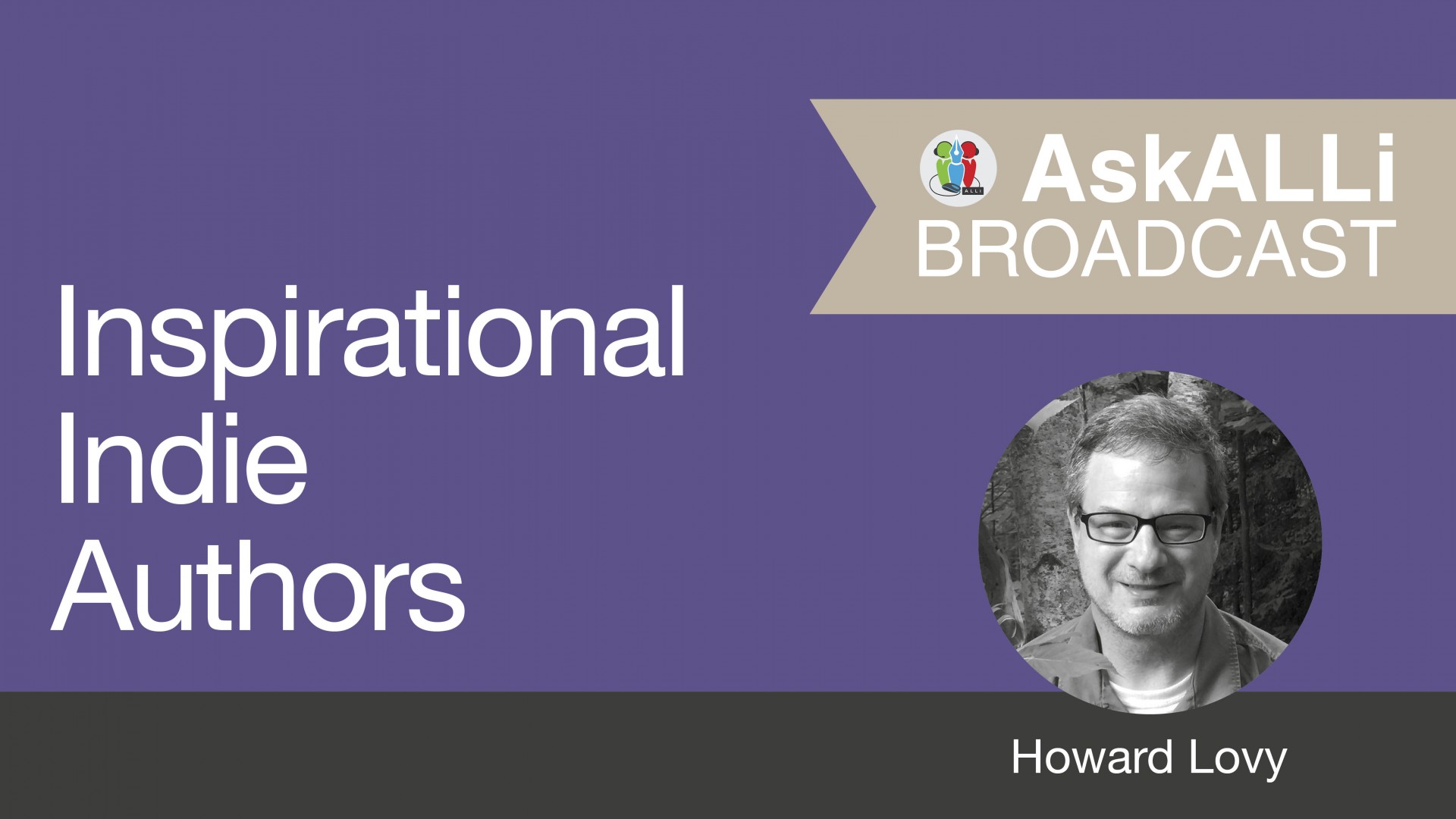
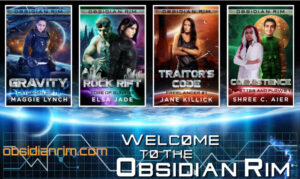
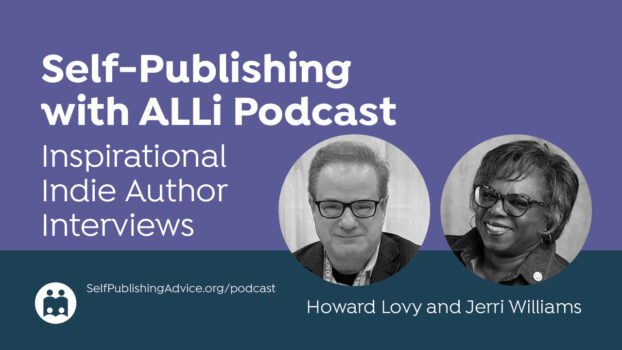


Thank you again, Howard, for this lovely opportunity to share the Obsidian Rim group project here. I am happy to answer questions here on the blog or elsewhere if people have them. I really do believe there are a number of reasons this kind of group project can work in a world where discoverability is so critical to indie authors.